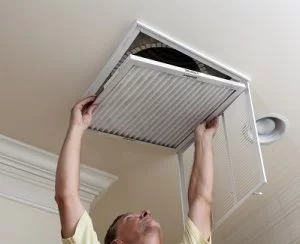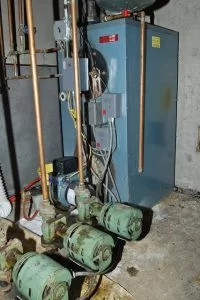When colder weather approaches, people often miss the natural warmth from the sunshine that long summer days provide. But as the temperatures get increasingly colder the further we get from the summer season, people must ensure that their residential and commercial properties remain heated to a comfortable temperature.
However, any situation that involves heat production comes with a significant risk for potential danger. For furnaces, in particular, there is the chance of a furnace fire breaking out. With the necessary care, you can eliminate the potential for such a disaster. When you educate yourself on how furnace fires start, then you can also be aware of how to prevent them from occurring.
Continue reading to learn more about furnace fires, the top causes for these fires, and how to prevent them.
What Can Cause a Furnace Fire?
Air Filter Blockage
 An air filter will gather dirt and debris that passes through a furnace, but it will eventually reach the point where it is filled with too much debris. If the air filter is not changed out, then this creates a blockage and makes the furnace less efficient than before. Because of the dirt that has accumulated, the furnace must work even harder than before to perform its job. This can cause the furnace to overheat and lead to the motor flaming up, resulting in a furnace fire.
An air filter will gather dirt and debris that passes through a furnace, but it will eventually reach the point where it is filled with too much debris. If the air filter is not changed out, then this creates a blockage and makes the furnace less efficient than before. Because of the dirt that has accumulated, the furnace must work even harder than before to perform its job. This can cause the furnace to overheat and lead to the motor flaming up, resulting in a furnace fire.
Carbon Monoxide Leak
Furnaces will produce carbon monoxide when they burn combustible fuel. But this shouldn’t be a problem so long as the furnace and its parts are all functioning correctly. The carbon monoxide should vent to the outside via the furnace flue. However, damaged parts could cause carbon monoxide to build up in the furnace instead of being promptly directed out through the flue. In such a case, the carbon monoxide accumulation could lead to a furnace fire.
High Gas Pressure
In a furnace’s combustion chamber, a balanced amount of gas and oxygen combine to produce heat that warms a property. This is done safely by using a particular pressure level. But if there is too much pressure, then the temperature becomes too high and encourages soot accumulation. This makes it easier for a furnace fire to break out.
Overheated Parts
Any overheated component of a furnace can cause the motor to overheat. This excessive heat then creates ideal conditions for a furnace fire.
How Can a Furnace Fire Be Prevented?
Regularly Change the Air Filter
Knowing that dirty air furnace filters can contribute to a furnace fire, it is important to change out your furnace’s air filter on a regular basis. This will ensure that the furnace can continue to function in an efficient manner while also eliminating dirt and debris from the air.
Additionally, clean up any dust that accumulates near the furnace. This cleaning will stop that nearby dust from making its way into the furnace.
Consistent Furnace Maintenance and Inspection
 Because broken parts can lead to a furnace fire, any issues must be addressed properly in a prompt manner. However, it is important that the job is done correctly, so you should reach out to a professional for help. Licensed HVAC technicians have the skills and expertise needed to perform regular maintenance and inspections for furnaces. They will be able to spot any potential problems and take care of them before a disaster happens.
Because broken parts can lead to a furnace fire, any issues must be addressed properly in a prompt manner. However, it is important that the job is done correctly, so you should reach out to a professional for help. Licensed HVAC technicians have the skills and expertise needed to perform regular maintenance and inspections for furnaces. They will be able to spot any potential problems and take care of them before a disaster happens.
Furthermore, have a professional clean your furnace at least once a year. In an ideal situation, your property’s furnace should undergo cleaning and maintenance prior to colder seasons. This ensures that, should any issues be found, they can be effectively handled before you are in real need of the furnace.
Professional Fire Damage Restoration Services
In the event of a furnace fire, act immediately just as you would with any other kind of fire. Evacuate the property and reach out to your local fire department to have the flames extinguished as soon as possible.
Once the fire has been put out, you may feel relieved — and understandably so. But the damage is not done when the flames are gone. Smoke, soot, and other corrosive byproducts will continue to linger after the fire is out and cause secondary damage.
Oftentimes, this additional harm is worse than the initial harm. Without prompt action, this damage can become permanent. Knowing this, seek help from professional fire damage restoration services immediately after your local fire department has extinguished the flames.
ServiceMaster Restoration and Cleaning offers professional fire damage restoration services to homes and businesses in the Houston, TX, area on a 24/7 basis. Within these services, our licensed fire restoration professionals will restore the damage, clean your property, and rebuild the structure. This work will restore your residential or commercial property to its previous condition, so it will be a safe space to occupy once again.

